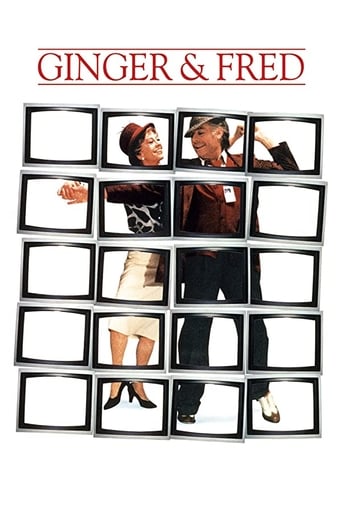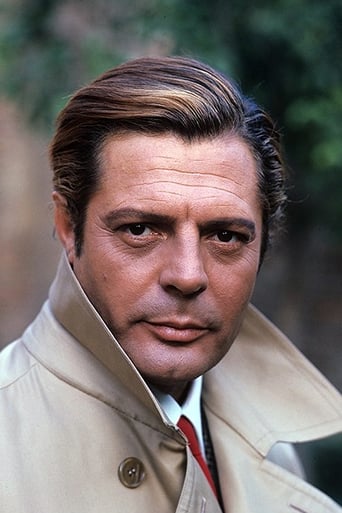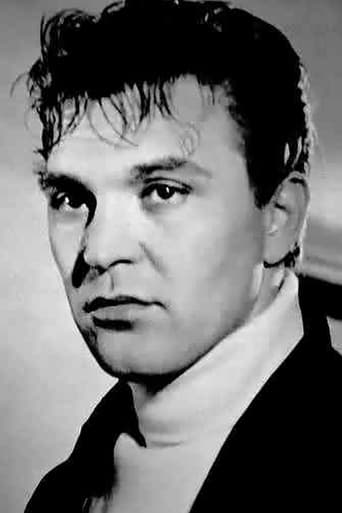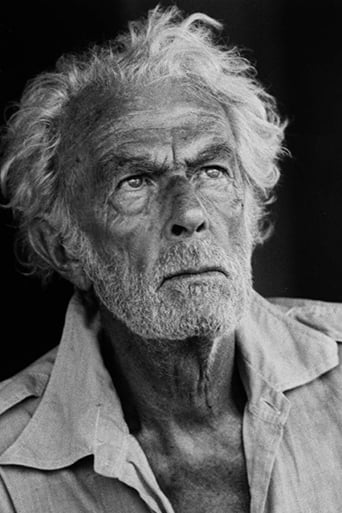felixoteiza
I didn't like this Fellini as much as maybe I should have, but the problem with it is, it's just too unfocused. And too long also, as a direct result of that. Now, I don't pretend to be able to see underwater--as the saying goes—but here good old Federico works his film as if he didn't have much time left on this Earth and he should hurry up putting into celluloid each theme, character, plot, situation, concept, image, he had still left in his bag: aging, bad TV, memory & memory loss, nostalgia, relationships, media trends, loneliness, terrorism, social revolt, crime, etc. I don't know what were the circumstances in his life at the time when he conceived G&F, but I wouldn't be surprised if something happened then that brought to his undivided attention and in the strongest possible terms the possibility of his own death; the fear that any day he could be gone and that he has to work fast and furious on what he had still to do while still in this world—and that he decided to include it all in this movie. See for ex. as in Intervista, shot a year later, there isn't one single mention of death, by him or by others--the film strictly focusing on the making of a film--while here Mastroiani's Fred/Pippo acts all along as if feeling he's already going down the final stretch; he even refers to it during the bus trip, when talking about things looking at him as if saying Farewell.The story revolves around a mature couple--I think in their 60s--who some 30 years ago had a dancing number imitating the then world famous Fred Astaire & Ginger Rogers. They have been separated since then and have been reunited now by a TV station for a variety program for Christmas, which will include all kinds of bizarre characters as guests: a senile Admiral, a flamenco troupe made of dwarfs, a couple who record voices of the dead, a woman who was paid not to watch TV for a month, etc. All that is mildly interesting but no much different from the weird characters and things that had populated many, if not most, of Fellini movies. Precious film time is spent, rather wasted, delving in the personal stories, comments of all these people while G & F, specially her, are let to their own devices in the midst of the crowd, their roles and relevance diluted in that human mass, those props and those TV sets--which is compounded by regular interruptions by commercials with scantily clad women peddling every possible consumer product. This way both leads are turned, in many instances, into mere witnesses, commentators, of the ongoing action, while precious little time is given to relevant information about what went on, or wrong, in their respective lives during those years they were performing and after that—except that Ginger/Amelia married and that Fred/Pippo had a prolonged visit to some institution, so distraught he was after they broke up. We feel for them, sure, specially because we can feel the passage of time in the way they communicate; in their arduous attempts to repeat the feats that their young bodies allowed them at the time—as we did also in Intervista with Mastroiani, also, and Anita Ekberg—but for the same reason this film should have focused a lot more on them rather than diluting itself in so many different things at the same time. I know Fellini was feeling strong urges to throw jabs at TV at the time, as he did with the Indians carrying TV antennas as spears in Intervista, but the film time spent in his settling of that particular score means precious time is spent that could have been better used on G & F, in their life stories.What makes that waste even worse is the fact that the acting is superb by both. The best scenes are in fact those where they are together—as when during the interruption of their dance, during their act, or when Pippo explains to somebody the origins of tapping dance—and that should have been obvious also for the director. All he had to do was to focus on them, their interaction, to have another classic, but he let it go. And the result is a rather lame Fellini, with his trademark exuberant colors, opulent cinematography, his usual cast of weirdos, yes, but one that keeps losing his soulful, nostalgic, way all along the road. I know G&F is prophetic in the way it predicts the evolution, or deterioration, of TV but who cares. He could have done another flick about that. About weirdos, Rome in Christmas, etc.Speaking of Woody Allen, who is lampooned in this movie, one thing he has in common with Fellini--and Kafka, I'd say—is that both are at their best when forgetting themselves; when they forget about their own personal phobias, insecurities, fantasies, egos, and do what they do best: lucid, uncompromising, social and psychological comment. Fellini referred to Intervista as a narcissistic film and he was wrong. That was the farthest to a narcissistic film he ever did. G & F is narcissistic--one where he sacrificed a superb story , wasted the talent of two brilliant actors, because he considered more important to settle his own scores with TV. That's the saddest thing about this movie. 6/10.
jaykay-10
Fellini had at his disposal a small, sharply focused, touching story about two unexceptional people whose time has passed - a time in which they were recognized for their imitation of others' style and talents. Each is lonely and presumably much in need of what the other can offer, but we are left with the feeling that, despite her hesitant offer, they will not get together.Unfortunately Fellini's self-indulgence turns what might- have- been into a sprawling, overdone satire of commercial television in which the story of those two is buried. There are two pictures here, and Fellini emphasizes the wrong one. Granted that his direction, in and of itself, is often brilliant, he is too inclined to make every film a tour de force. His segment of "Spirits of the Dead," which I recently saw for the first time, suffers in the same way.






